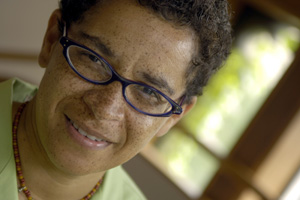African American History Uncapped by UNCAP
By Michele Lenni in Miscellaneous on Jan 18, 2011 8:00PM

Jacqueline Goldsby, image via chronicle.uchicago.edu
It all began when Goldsby started researching a new book on the black literary scene in Chicago. She began discovering collections sitting in institutional storage rooms, still unpacked, and others gathering dust in family basements and attics. Knowing that a great deal of this history was sitting unsuspected and or undiscovered, Goldsby started a grass roots effort to uncover these precious artifacts, knocking on doors and calling institutions around the city inquiring if they needed help with their archival efforts. The Chicago Defender tipped her off to a vacant warehouse on Odgen Avenue. "I'm getting goose bumps all over again when I think about it," said Goldsby to the Tribune. Delving into stacks upon stacks of papers in the dimly lit, dank, non-air-conditioned space she discovered correspondence between Defender editor John Sengstacke and President Harry S. Truman about desegregating the Army; photographs of Booker T. Washington with his family; about 100 home movies of the Sengstackes that depicted an elite black family during the 1940s.
Goldsby's discovery led to the creation of Uncovering New Chicago Archives Project, or UNCAP, which became a broader effort by the University of Chicago, the Chicago Public Library, Chicago Defender, the DuSable Museum of African American History and the South Side Community Art Center to find and organize African-American historical collections. With the help of graduate students in relevant fields, the project has successfully unearthed and archived a great deal of Chicago's unknown documents on Black History, archives of jazz musicians and the early history of the movement, and Chicago's rich and under-appreciated black modern poetry scene. "The material is there; it's a matter of getting it," said oral historian and author Timuel D. Black Jr . to the Tribune. Black is the acclaimed author of "Bridges of Memory," the two-volume oral history documenting the impact of the Great Migration on Chicago history. "Black Chicago is one of the most important places not just in African-American history but American history. The president of the United States came from Chicago."
As the project has grown and expanded throughout the years, they out-grew their funding. Luckily the University of Chicago Department of Special Collections won a three-year, $617,000 grant from the Andrew W. Mellon Foundation to help create a new approach to processing the collections. Although the funding was a great help to the organization, keeping the artifacts available to the public became a great concern when Sotheby's announced that it would auction the private papers of Martin Luther King Jr. Goldsby convinced Robert Sengstacke, John Sengstacke's son, to donate the papers to UNCAP. Goldsby told Sengstake "'Don't send them to D.C. Don't send them to New York. Keep them in the place where the paper did its work, where schoolchildren and journalists and the black community can access them."
Thanks to Goldsby, these papers can now be viewed at the Woodson Regional branch of the Chicago Public Library, and a great deal of the research collected by UNCAP is available to all with just a click of your mouse.